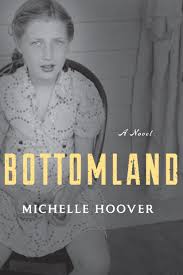A New Familiar Story
The hardships of the immigrant experience to America in the late 1800s and early 1900s. The isolation of life in the upper midwest. The lure, threat and promise of the big city. Patriarchy, misogyny, violence. Bigotry in World War I. Second and third generation immigrants families. These are recognizeable themes in American literature.
Familiar themes, though, do not have to limit a novel’s scope or imagination.
Michelle Hoover’s Bottomland is about the disappearance of two daughters from the German family homestead in rural Iowa in the early part of the twentieth century. Hoover tells the story in five chapters, each from a character’s perspective. She plays with time, with narrative veracity, and with the plot. It unfolds in bits and pieces. Hoover, though, is not interested in writing a thriller or mystery. Tension is used in service of broader themes, particularly those of interpersonal connection and agency. The prose is marked by an austere clarity – even when the picture is foggy and described by an unreliable narrator.
Bottomland is a thoughtful and well-written novel. It is also surprisingly relevant to contemporary life. Pick your immigrant group, imagination the perspective of one with little agency in a world with few or no guarantees, add a bit of cross-cultural tension – and it all rings as familiar. Hoover has crafted a clever and thoughtful book.
I wonder if novelists will be looking at Somalian immigrants in Minnesota or Syrian immigrants in Michigan twenty years hence. If they do – and do it well as Bottomland – I will read and learn.
David Potash